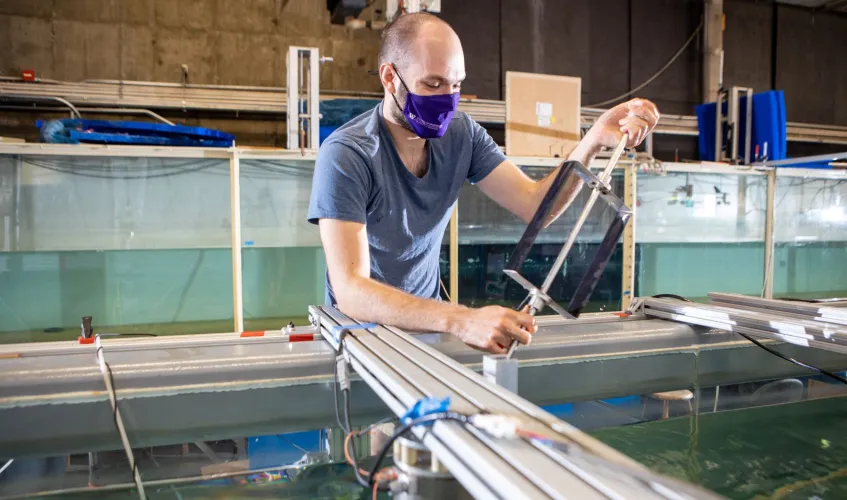By Andy Freeberg
January 4, 2021

ME staff researcher Aidan Hunt inspects a marine energy turbine at UW's Alice C. Tyler Flume. (University of Washington / Matt Hagen)
Two recent funding announcements from the U.S. Department of Energy (DOE) are good news for UW’s marine renewable energy research.
Marine energy includes any power generated from marine sources, such as the steady, dependable flows of the world’s rivers and tides. Now, through a $2 million DOE project, a UW research team will dive deep into the dynamics of marine energy turbines that might be a path to cost-effective, environmentally-friendly clean energy from rivers and tidal channels. The project is one of 11 selected by the Advanced Research Projects Agency-Energy’s (ARPA-E) competitive Submarine Hydrokinetic And Riverine Kilo-megawatt Systems (SHARKS) program.
“We’ve been studying these systems for a decade and we’re at a point with all of the information we’ve gathered to co-design them and take into account the many different, interrelated factors that ultimately affect how well they work,” says project lead Brian Polagye, a UW associate professor of mechanical engineering (ME) and director of the Pacific Marine Energy Center (PMEC). “This project will combine flume experiments, turbulence imaging, machine learning and advanced simulation to give us a wealth of new knowledge about how to construct and operate an optimal array of these turbines in tidal channels or rivers, while also taking environmental and societal considerations into account.”
Another exciting opportunity for marine renewable energy is to capture the power of ocean waves. Engineers have designed an assortment of devices to generate wave energy over the years but none of these systems have proven themselves reliable and cost effective enough to go into widespread use. With another recently funded project, this one from the DOE’s Water Power Technologies Office (WPTO), a UW team led by Brian Johnson, an assistant professor of electrical and computer engineering (ECE), will drill down to the basics of wave energy systems and unify several of the complex factors that determine how effectively a wave energy converter does its job. Because designing a wave energy system requires experts in ocean wave dynamics, fluid-structure interactions, device mechanics, electronics and power controls, the team will collaborate on a model that bridges all the disciplines to narrow down the best future designs.
Both new marine energy projects draw faculty from multiple College of Engineering departments. The SHARKS project includes Brian Polagye and Steve Brunton from ME, Owen Williams from Aeronautics & Astronautics, Brian Johnson from ECE, and Michael Motley and Richard Wiebe from Civil & Environmental Engineering (CEE). The WPTO project includes Johnson and Polagye, as well as Jim Thomson from CEE and the UW Applied Physics Laboratory, and several PMEC-affiliated faculty members at Oregon State University. Polagye says the multi-disciplinary nature of marine energy is one of the things that makes these projects so important.
“One of the great things about UW and PMEC is we have access to experts in everything from hydrodynamics and control systems to power electronics and environmental considerations,” says Polagye. “This new funding from the DOE allows us to do critical foundational research while also engaging students in projects that will prepare them to be part of the skilled workforce we need to move marine renewable energy into mainstream commercial use. Moreover, as a leader in both marine environments and technological innovation, this kind of ‘blue innovation’ is one place UW and PMEC have a chance to make a meaningful impact on a more sustainable future. In the big picture, that’s what I’m really excited about.”
The Pacific Marine Energy Center is an umbrella organization that unifies research & development, testing and educational programs in marine energy across the University of Washington (lead), Oregon State University and the University of Alaska Fairbanks.